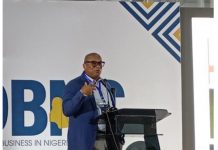

Telecommunications companies has started to speed up rollout of Fourth Generation Long Term Evolution (4G LTE) networks following recent threats by the minister of communication, Barrister Adebayo Shittu to penalise operators who are slowing broadband plan of the country by not sticking to the rollout obligations enshrined in their operating licence.
The minister who read the riot act to operators said the various complaints of telecoms subscribers across board and the challenges besetting telecoms operators in Nigeria are been looked into holistically. He said if operators don’t rollout 3G and 4G networks fast the country may not meet its 30 per cent target in the National Broadband Policy.
According to Shittu, rather than abating, the litany of complaints by subscribers grows daily. He said “With the acquisition of 800MHZ frequency by some of the operators and the recently auctioned 2.6GHZ spectrum by NCC, the network operators will be encouraged to rollout 4G/LTE network so as to increase broadband penetration as enshrined in the National Broadband Policy (2013 – 2018) of the federal government.”
The threat of sanctionsand the desire for first mover advantage is spurring the mobile networks to intensify their 4G network rollouts in major cities. MTN Nigeria, Smile Communications Nigeria Limited, Ntel, Spectranet and Intercellular Nigeria are trumping Voice over Long Term Evolution (VoLTE) with high speed video and data services to Nigerians. The race is getting hotter as the year has entered its second half.
Sources at MTN informed LEADERSHIP that Nigeria’s largest mobile network would unleash its 4G LTE network any moment in August. MTN is spending $716 million to expand its network nationwide in 2016 fiscal year. Part of the money is being used to build a fibre-network rollout in six cities. MTN plans to have about 1,500 LTE collocated sites backhauled with fibre optics this year.
MTN paid N47.5 billion to acquire Visafone Communications Ltd’s assets including its frequency and 2.1 million customers to improve the quality of MTN’s broadband services for its subscribers. It is deploying 4GLTE broadband services using the 800MHz frequency acquired from Visafone.
Mr. Fedinand Moolman, CEO, MTN Nigeria said recently that “The plans are to have commercial available LTE early quarter three, albeit very limited, obviously not substantial, and then to start expanding this towards quarter four and first quarter of next year. It is obviously a comprehensive project” he said.
On the other hand, a fortnight ago Smile Telecom said its mobile app and simcard for Voice over LTE (VoLTE) network in eight cities including Lagos, Abuja, Benin, Kaduna, Ibadan, Port Harcourt, Asaba and Onitsha will allow Nigerians to enjoy seamless, super clear voice and video calls from anywhere in the world on its 4GLTE network.
Managing director of Smile Nigeria, Godfrey Efeurhobo said plans are on the way to roll out services in more cities of Nigeria to offer the best super fast 4G LTE mobile broadband and voice services in its expansion drive beyond the current eight cities.
Just last week, Ntel secured significant investment from businessman and respected philanthropist, General TY Danjuma who emerged its board chairman. The investment would be used to fast track its LTE Advanced (LTE-A) network. Ntel since its commercial launch of its 4G LTE network in April 2016 has struggled to compete financially. Ntel’s 4G services are still skeletal in Lagos and Abuja.
Also, Intercellular Nigeria, one of the pioneer private telephone operators (PTOs) plans to launch 4G LTE services in key strategic cities across the country. It has chosen Huawei to migrate its Code Division Multiple Access (CDMA) network to a 4G LTE technology in order to provide high speed data and voice services.
At present majority of data users use 2G/3G technologies and it is estimated that LTE users will constitute 80 per cent of all data users by 2019. Availability of 4G LTE mobile broadband services on a national scale starting 2016 is expected to act as a catalyst to many sectors of the economy like e-commerce, banking, insurance and financial services, software and IT enabled services etc., and is likely to trigger widening of the revenue base of the federal government into non-oil sectors














































